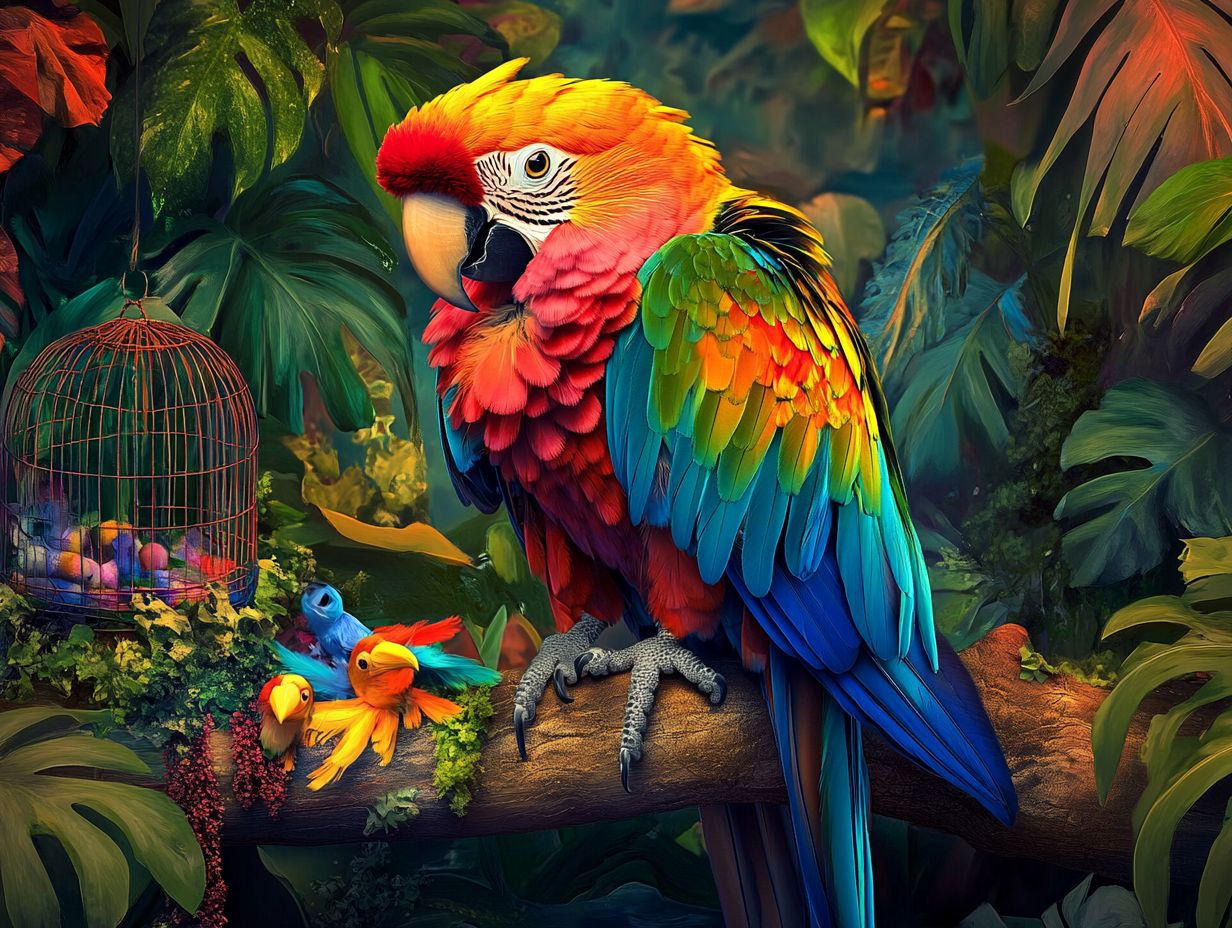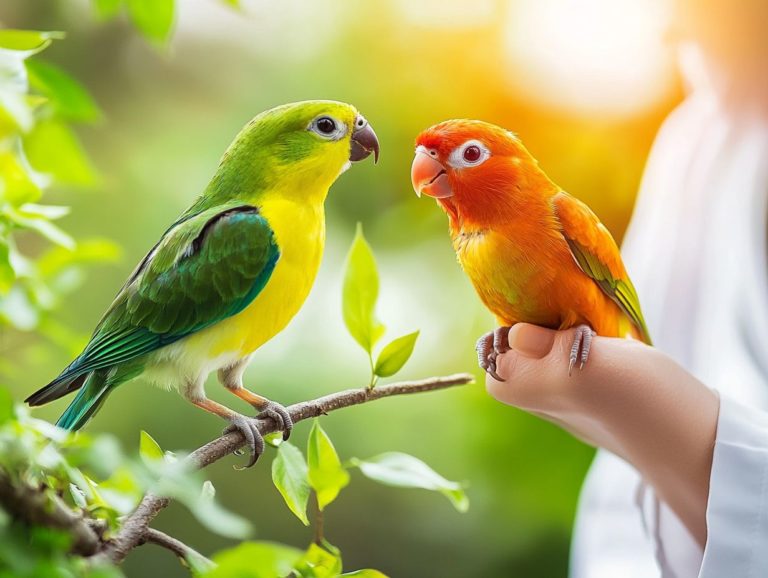What Are Common Myths About Pet Birds?
When it comes to pet birds, misconceptions abound. It s easy to fall prey to myths that can cloud your understanding of these fascinating creatures.
You might believe that all birds can talk or think they are low-maintenance pets. However, these misconceptions can significantly impact how you care for and appreciate your avian companions.
In this exploration, you ll debunk common myths about pet birds, uncover the realities of their needs, and discover essential tips for ensuring they lead happy, healthy lives. Whether you re contemplating adopting a feathered friend or simply curious about them, grasping these truths will elevate your bird-keeping journey.
Contents
Key Takeaways:
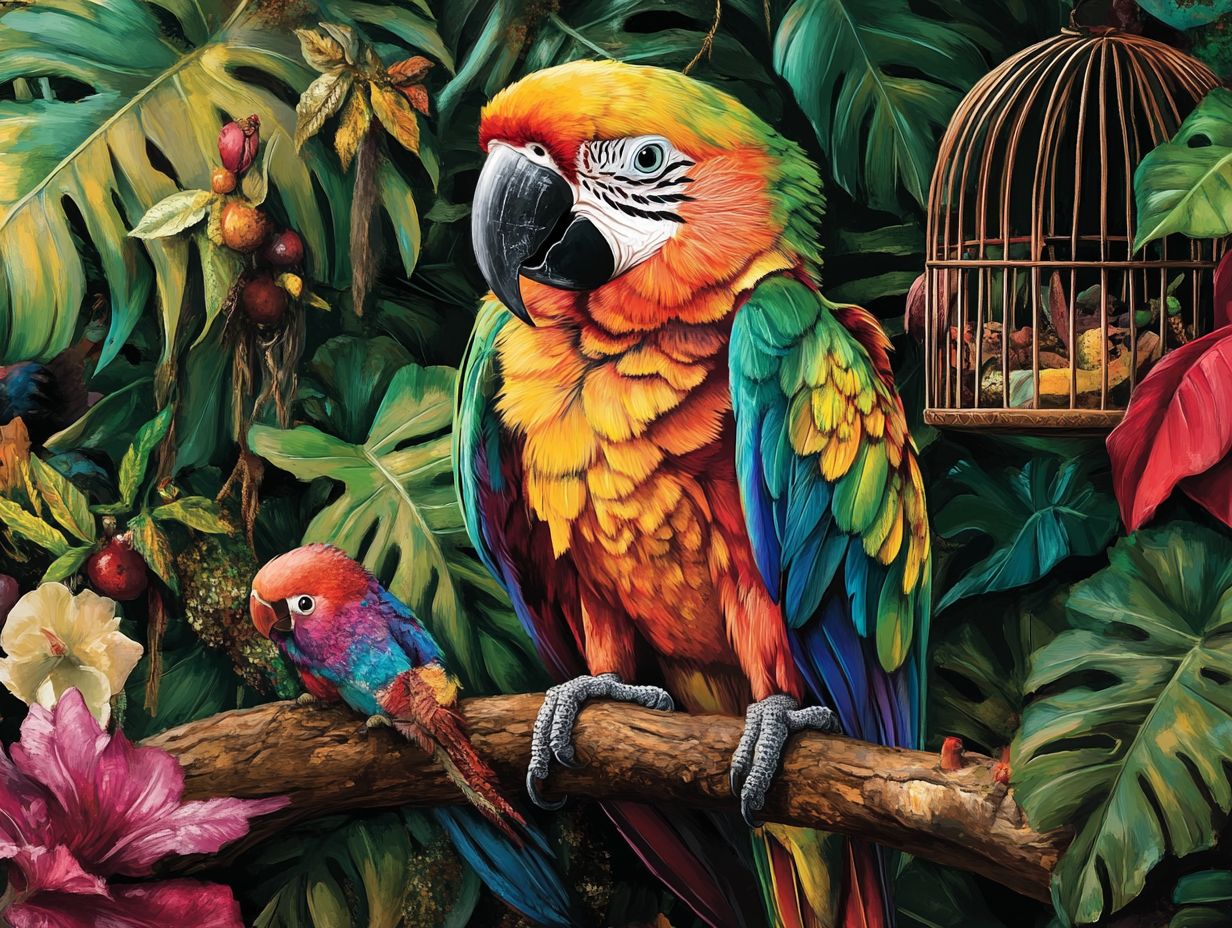
- Not all pet birds can talk; it is not a natural ability for them.
- Birds need a balanced diet of seeds, pellets, and fresh fruits and vegetables for optimal health.
- While they may not require as much attention as a dog or cat, birds still need daily social interaction and mental stimulation.
Types of Pet Birds
When exploring the types of pet birds, it’s crucial to appreciate the diverse array of species at your fingertips. Each species boasts its own unique characteristics, behaviors, and emotional needs.
Take parrots, for instance renowned for their sociable nature and remarkable intelligence.
Choosing the right bird can make your pet-keeping adventure truly rewarding! This choice will profoundly influence the long-term care and overall wellbeing of both you and your feathered companion.
It s essential to delve deep into the individual personalities and requirements of each species to ensure a harmonious bond.
Myths About Pet Birds
Myths surrounding pet birds are pervasive and can easily mislead potential bird owners. These misconceptions can foster misunderstandings about their care and behavior.
Many people think birds can talk like humans or assume they are solely capable of copying what people say. This can result in skewed expectations and a lack of comprehension regarding their true needs.
Recognizing these common beliefs is essential for responsible pet ownership, as it directly influences the emotional well-being and welfare of these highly intelligent creatures.
Myth #1: Birds Can Talk
One of the most common myths surrounding birds, especially parrots, is the belief that they can genuinely ‘talk’ like humans. This misconception can lead to misunderstandings about their communication skills and intelligence.
While many parrot species can mimic human speech, they don t truly understand language in the way you do. Instead, their vocalizations serve as a unique form of communication that reflects their social nature and environmental influences.
It s essential to realize that the sounds parrots produce are influenced largely by their surroundings and the stimuli they encounter. For example, a parrot might imitate the sound of a doorbell or catchy phrases from beloved television shows, associating these sounds with specific contexts rather than comprehending their meanings.
This mimicking behavior underscores the intricacies of avian communication. While parrots can replicate sounds, it doesn t equate to true understanding. Their vocalizations offer insight into their social structures and interactions within flocks, showcasing their capacity to build connections with humans and other birds, albeit in a manner distinct from human language.
Myth #2: Birds Only Eat Seeds
Many people believe that birds, especially parrots, can thrive only on a seed-based diet. This myth can lead to serious health issues for your feathered friend.
A balanced diet for your parrot should include a variety of fresh fruits, vegetables, and high-quality pellets. This variety meets their nutritional needs and helps keep them healthy and happy.
Offering a diverse selection of foods not only enhances their nutrition but also stimulates their natural foraging instincts. This keeps their minds lively and engaged.
Incorporating dark leafy greens, sweet potatoes, and grains into their meals can significantly boost their vitamin and mineral absorption. This nourishes their beautiful feathers and supports their immune systems.
As a responsible parrot caretaker, it’s essential to educate yourself on proper parrot care. Consider various dietary options, including cooked legumes and occasional treats like nuts, to reinforce a wholesome diet.
By debunking the myth of a seed-only diet, you can prevent issues such as obesity, liver disease, and other health concerns related to poor nutrition.
Myth #3: Birds Are Low Maintenance Pets
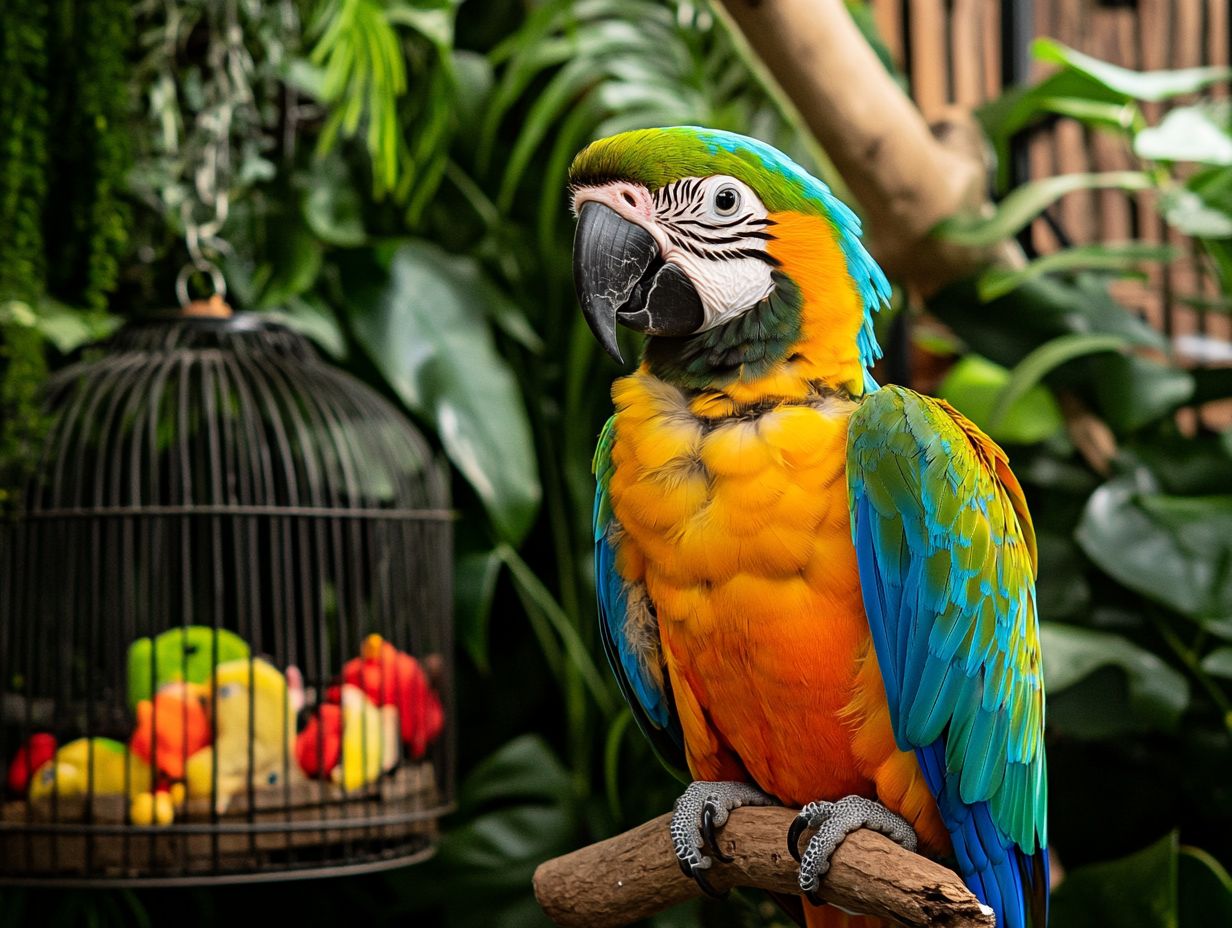
Many people mistakenly think birds are low-maintenance pets, especially the smaller species. But don t be fooled! These charming creatures have intricate needs for socialization and mental stimulation.
Despite their delightful appearance, parrots require significant attention, proper care, and training to prevent behavioral issues and ensure their emotional well-being.
This misconception often leads prospective bird owners to underestimate the time commitment necessary for nurturing a pet bird’s overall health. Unlike cats and dogs, which can thrive on a bit of independence, birds truly flourish with regular interaction with their human companions.
Without this social engagement, birds may develop anxiety or resort to destructive behaviors.
Training isn t just an optional step; it s essential for building a trusting relationship. It helps prevent issues like biting or excessive screeching. By understanding these needs, you can create a fulfilling environment that allows your pet bird to genuinely thrive.
Myth #4: Birds Can’t be Trained
A common misconception about birds is that they re untrainable. This significantly downplays the effectiveness of positive reinforcement techniques applicable to parrots and other species.
In reality, training your feathered friend is essential for their care. It not only encourages good behavior but also enhances their emotional well-being and deepens the bond between you and your pet.
By utilizing methods like clicker training and reward-based systems, you can teach your avian companion a range of desirable behaviors, from simple commands to impressive tricks.
Scientific research has shown that birds possess cognitive abilities that enable them to grasp and respond to cues. They can be quick learners when placed in the right environment.
The advantages of training extend beyond your bird’s development. You ll find immense satisfaction in witnessing their progress. Regular training sessions offer valuable mental stimulation, helping to mitigate behavioral issues that often arise from boredom or lack of engagement.
Myth #5: Birds Don’t Need Social Interaction
Contrary to the common belief that birds lead solitary lives, many species, particularly parrots, flourish in social settings. They require companionship not just from their human caretakers but ideally from other birds as well to meet their emotional needs. This misconception can lead to a misunderstanding of their flock mentality the natural way birds live together in groups and the vital role social bonds play in their behavioral development.
Parrots, for instance, exhibit intricate social behaviors that highlight their dependence on companionship for emotional well-being. These vibrant creatures communicate in various ways, from lively vocalizations to expressive body language. They form relationships akin to those found in human social structures. When interaction is lacking, they can experience stress and develop behavioral issues, underscoring the essential nature of their socialization requirements.
Providing avenues for engagement with both humans and potential feathered companions enriches their lives. This boosts their happiness and health in your care.
Debunking Common Myths
Debunking common myths about birds is crucial for enhancing your understanding of their distinctive behaviors, needs, and characteristics, especially if you’re considering becoming a pet owner.
Education serves as a powerful tool in dispelling misconceptions surrounding birds, including parrots. It underscores the importance of responsible ownership that prioritizes their emotional and physical well-being.
Explanation and Facts
Understanding how birds behave is crucial for any future bird owner, especially when it comes to intelligent and sociable species like parrots. By educating yourself on these topics, you can ensure that you meet your feathered companions’ emotional and physical needs, ultimately fostering better animal welfare and a more harmonious relationship.
Delving into the intricacies of avian communication allows you to interpret the subtle sounds and body language that reveal your birds’ moods and preferences. Recognizing that social interaction and mental stimulation are vital to a bird’s well-being is essential. Knowing what birds should eat, creating safe environments, and scheduling regular veterinary check-ups will significantly enhance the quality of life for these vibrant companions.
Informed pet ownership enables you to craft enriching habitats, resulting in healthier, happier birds that thrive in a loving and supportive environment.
Tips for Caring for Pet Birds
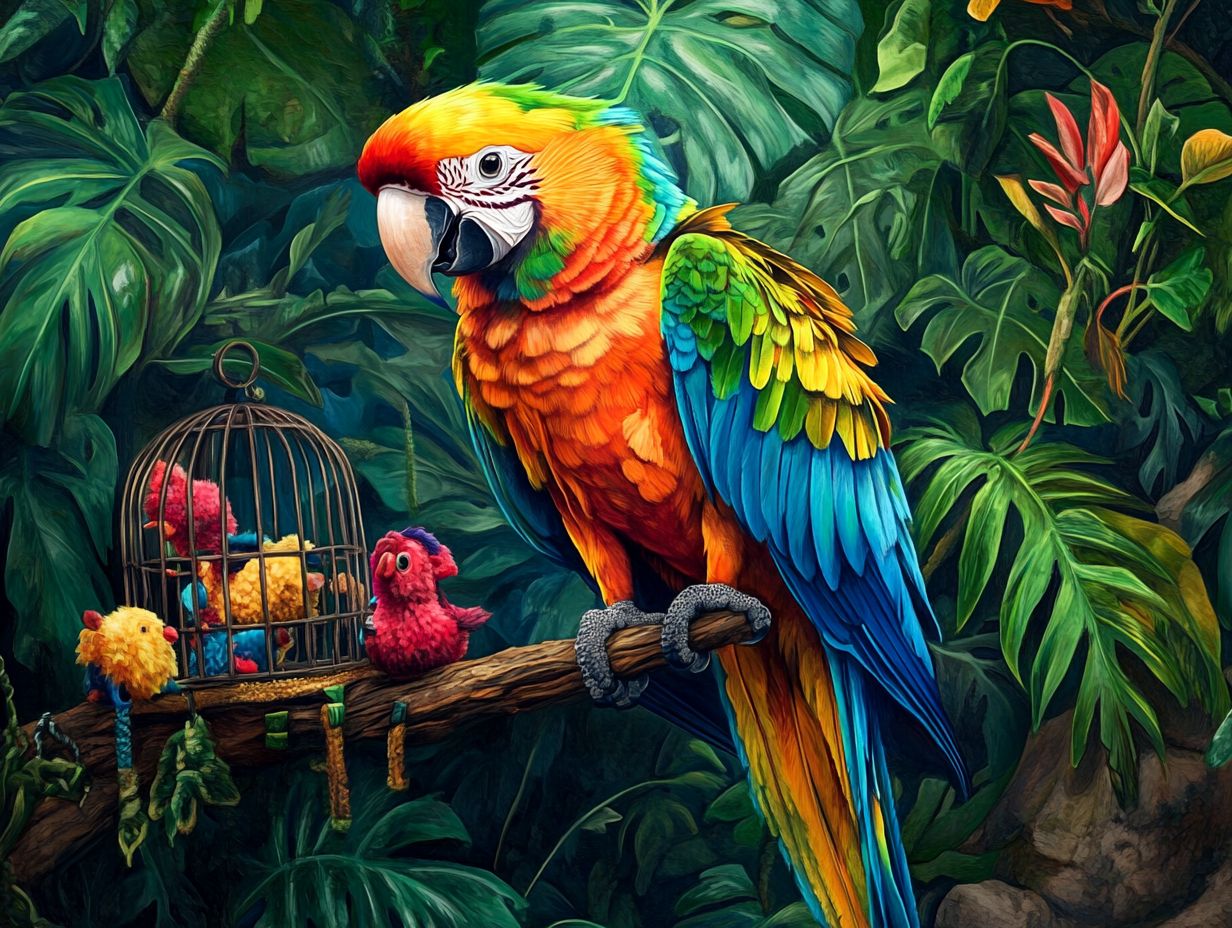
Caring for pet birds, especially the highly intelligent species like parrots, requires a deep understanding of their unique needs and effective strategies for their care and well-being. To ensure these remarkable birds thrive in your home, focus on proper nutrition, foster socialization, and apply engaging training methods that cater to their emotional and physical needs.
This thoughtful approach creates an enriching environment where your feathered companions can truly flourish.
Proper Nutrition and Socialization
Proper nutrition and socialization are essential cornerstones for the health and emotional well-being of your pet bird, especially if you have a parrot. To thrive, these vibrant creatures require a balanced diet that includes a delightful array of fruits, vegetables, and pellets. Socialization plays an equally vital role, providing a sense of belonging and contentment that mirrors their natural flock dynamics.
A diet rich in essential nutrients bolsters their physical health and enhances cognitive function and overall behavior. Parrots flourish with a well-rounded mix of seeds, grains, and high-quality commercial pellets, ensuring they receive vital vitamins and minerals. Fresh produce think leafy greens and an explosion of colorful fruits can work wonders in preventing obesity and associated health issues.
Integrating social activities into their daily routine, such as engaging with you or other birds, is crucial for reducing stress and alleviating boredom. Regular interaction helps your parrot feel secure and valued, leading to a more enriched and joyful life.
Start your bird care journey today!
Training and Enrichment Activities
Training and enrichment activities for your pet bird, especially if it s a parrot, are absolutely essential for fostering good behavior and mental stimulation. These fun activities let your bird show off its natural skills and learn exciting new tricks!
By employing positive reinforcement techniques rewarding good behavior you can turn training sessions into enjoyable experiences for both of you. This strengthens your bond and enhances overall well-being.
Consider integrating a variety of training methods, such as clicker training or target training, to capture your parrot’s attention and enrich the learning experience. Providing engaging enrichment activities think puzzle toys, foraging games, or even supervised flight opportunities can significantly stimulate their minds.
Exploring different social interactions and routines can personalize the training process. This ensures your intelligent companion stays entertained and content. By taking the time to understand their unique personalities and preferences, you can create a stimulating environment that meets their emotional and physical needs, leading to a happier and more balanced companion.
Frequently Asked Questions
What are common myths about pet birds?
1. Myth: All birds can talk like parrots.
While certain species of parrots are known for their ability to mimic human speech, not all birds have this skill. It is important to research the specific species of bird before assuming they can talk.
2. Myth: Birds only need seeds for a balanced diet.
Make sure to give your bird a mix of fruits, veggies, and pellets for a healthy diet! Seeds alone do not provide all the necessary nutrients.
3. Myth: Birds are low maintenance pets.
Many people believe that birds are low maintenance pets, but this is not true. They require daily care, attention, and interaction to thrive.
4. Myth: Birds can only be kept in cages.
While cages are necessary for birds to sleep and feel safe, they also need time outside their cage for exercise and mental stimulation. Bird-proofing a room and supervised playtime can provide a larger living space.
5. Myth: Birds are not affectionate pets.
This myth stems from the misconception that birds are only decorative pets. In reality, birds can form strong bonds with their owners and crave affection and attention.
6. Myth: Birds don’t need veterinary care.
Birds are susceptible to a variety of health issues and require regular check-ups and preventative care, just like any other pet. It is important to find a veterinarian who specializes in avian care to ensure the best health for your feathered friend.

